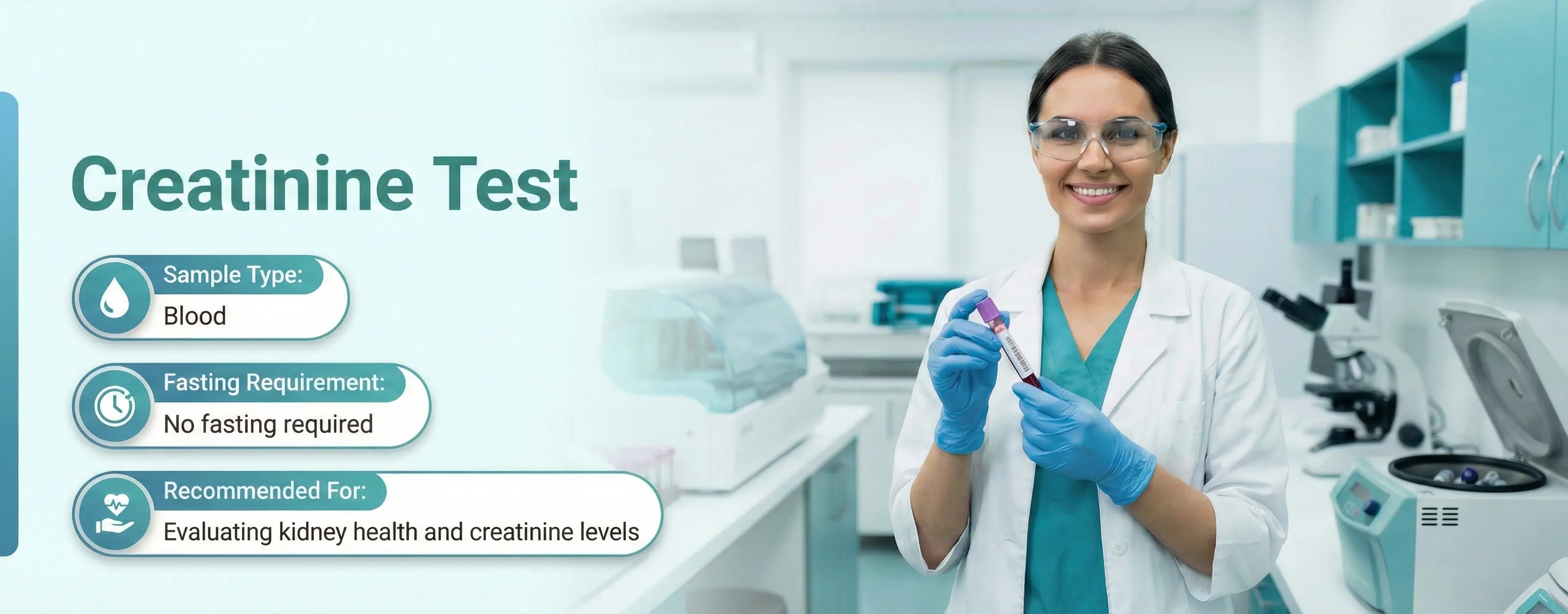2586+ orders placed in your location
100% NABL & ISO Certified Lab • 100% Accurate Reports
Creatinine Test
Serum Creatinine, Blood Creatinine, Creatinine Test
- SummaryThe Creatinine Test is taken to evaluate the health of your kidneys by estimating the creatinine levels in your blood. The test is done through a blood sample, and fasting is usually not required, though your doctor may advise it in some cases.Read more
- Reports Within10 HrsView Sample Report100% NABL & ISO Certified Labs
- SampleBlood
- AgeAll Age Group
- GenderMale and Female
- FastingNot Required
PharmEasy Promises
Know More About The Test
A quick info on Creatinine test
Overview
Muscles help in the movement of our bodies, but they need creatine to function, which is an organic acid that supplies energy to cells. When it breaks down, creatinine is produced as a waste by-product. It is then carried to the kidney via blood. This creatinine later tells physicians whether or not our kidneys are working properly.
Improper functioning of kidneys is shown by symptoms like fatigue, loss of appetite, lower back pain, change in the amount and frequency of urine, nausea, and vomiting. The consulting doctor will ask you to check the creatinine levels, which are tested through a creatinine test. And the test tells the doctors whether the kidneys are working properly.
High levels of creatinine show the kidney is not working properly. It can be due to bacterial infection, kidney stones, diabetes, or dehydration.
The creatinine test is also performed as a part of other tests like the Blood Urea Nitrogen (BUN) test, Kidney function test and Basic Metabolic Panel (BMP).
Sample Type
A simple venous blood sample is sufficient to test blood levels of creatinine. The creatinine levels are detected in the serum, which is a component of the blood.
Risk Assessment
Glomerulitis, Kidney stones, Prostate disease, Chronic Kidney Disease(CKD)
What does this test detect?
Some disease conditions for which a creatinine test is prescribed are:
- Malnutrition
- Dehydration
- Diabetes
- High blood pressure
- Chronic kidney disease
- Kidney stones
- Prostate disease
- Glomerulonephritis
- Bacterial infection in kidney
- Congestive heart failure
- Pregnancy
- Family history of kidney disease
- Procedures like CECT
- Check fitness for surgery
In the above-mentioned conditions, creatinine level is measured along with other parameters. Once doctors arrive at a diagnosis, they begin the treatment. The doctors may prescribe the creatinine test at regular intervals to assess the kidney health and effect of treatment.
The creatinine test is also prescribed as a routine physical test in healthy adults. It is examined in the basic metabolic panel. The test also helps in the early detection of kidney damage. Therefore, it is also prescribed for screening kidney disease.
The creatinine test is suitable for all men and women. Some medications can interfere with the results of creatinine test results. If you are taking any medicine, ask your doctor about it.
Indications for Creatinine Test
The creatinine test measures the amount of creatinine in the blood.
The abnormal levels of creatinine indicate there is some problem with the kidneys. The body will show symptoms of kidney damage like:
- Change in the amount, appearance and frequency of urine
- Nausea
- Chest pain
- Vomiting
- Cramps in muscles
- Swelling in face, ankles, wrist and stomach
- Fatigue
- Loss of appetite
- Itchiness
- Pain in the lower back
The consulting physician will prescribe the creatinine test if the person shows such symptoms along with other signs of kidney damage or to check the level of fitness before surgery or any procedure like a CECT scan.
How frequently should you take this test?
You can take the creatinine test as a part of your regular health checkup. If you have diabetes, high blood pressure, or/and any symptom of kidney damage, your doctor will prescribe you this test. It can be tested at regular intervals to monitor kidney health. The results of the creatinine test will also help the doctor in understanding the efficacy of the treatment plan.
Test Preparation
What to Expect During the Test
Before the Test
Usually, there's no need to make any special preparations for the Creatinine test. However, if your doctor has recommended this test along with another one that requires fasting, they might advise you to avoid certain foods. Talk to your doctor before any test for the best outcomes.
During the Test
A vein in your arm will be pricked to collect a blood sample. Here's what you can anticipate during the procedure:
- The site where the needle is inserted will be cleaned with an antiseptic solution.
- A tourniquet will be applied to your arm to make finding the veins easier.
- A needle will be inserted into the vein to draw blood. You might experience a quick pinch for a few seconds.
- The blood will be collected in a vial/tube, which will be labelled with your details.
After the Test
After the blood has been drawn:
- A bandage will be applied to the area where the needle was inserted to prevent any bleeding.
- It's normal to have some bruising. Some people might feel dizzy and should rest for a few minutes.
- In case of bleeding, pain, or rashes at the site of the puncture, it's important to reach out to your healthcare provider.
Parameters
The creatinine test considers the following parameters:
- The value of creatinine in the blood. It is expressed as milligrams per deciliter (mg/dL) of blood.
- The result of the creatinine test is expressed as normal, high or low. High levels indicate the improper working of kidneys due to some underlying health conditions. A low level indicates malnutrition or muscle loss.
Ranges
The reference range for serum creatinine level is
|
Serum creatinine level |
Male |
Female |
|---|---|---|
|
Normal |
0.9-1.3 mg/dL |
0.6-1.1mg/dL |
|
High |
>1.3 mg/dL |
>1.1 mg/dL |
|
Low |
<0.9 mg/dL |
<0.6mg/dL |
The normal values and reference ranges of the test may vary from lab to lab. Please refer to the ranges mentioned in the report and consult a doctor to understand the interpretation of lab reports.
- For children 3 to 18 years of age, the normal serum creatinine level is 0.5-1.0mg/dL.
- The creatinine level range may vary but typically lies between the above-mentioned values.
- The creatinine value also depends upon age, race, and body mass.
- Women have lower creatinine levels due to less muscle mass.
- Pregnant women may have abnormal levels of creatinine due to some complications.
Test Result Interpretation
The results of the creatinine test depend upon many factors like age, diet, body weight, muscle mass, and even race. The consulting doctor can guide you better with the results in your specific context. The test interpretation will also depend upon the symptoms for which you took the test.
Interpretation of serum creatinine test:
Normal- The serum creatinine level is between the range of 0.9-1.3 mg/dL for adult males and 0.6-1.1mg/dL for adult females.
A high level of creatinine is seen in certain conditions like:
- High blood pressure
- Diabetes
- Dehydration
- Complications in pregnancy
- Infections in kidney
- Kidney stones
- Urinary tract infection
- Prostate disease
- Consumption of large amounts of meat.
- Certain medications like ibuprofen and aspirins
- Chronic kidney disease
- Autoimmune conditions like lupus nephritis
The low level of creatinine is seen in certain conditions like:
- Low muscle mass
- Old age
- Malnutrition
- Bed-bound patients or those who have been ill for a long time.
Any abnormal level of creatinine is not a problem in itself. Instead, it shows there is some other problem that needs to be diagnosed and treated. Low levels of creatinine are not considered any serious health issue, but high levels are a matter of concern.
Price/Cost
Typically, a Creatinine test is priced in the range of INR 135 to INR 329. However, the price can vary based on the city and the laboratory chosen. To provide a more detailed overview, here are the average cost of Creatinine test in several major Indian cities:
City | Min Price | Average Price | Max Price |
135 | 232 | 329 | |
135 | 232 | 329 | |
135 | 232 | 329 | |
135 | 232 | 329 | |
135 | 232 | 329 | |
135 | 232 | 329 | |
135 | 232 | 329 | |
135 | 232 | 329 | |
135 | 232 | 329 | |
135 | 232 | 329 |
Risks and Limitations
The Creatinine test is a conventional blood test that is unlikely to trigger complications. But contact your physician immediately if you experience the following problems:
- Continuous bleeding from the needle insertion site.
- Pain or swelling at the site of blood collection.
Limitations of the test
- Intervention in the outcomes of tests by errors from the equipment or humans.
- Wrong understanding of the markers.
Was This Test Information Helpful?
Please rate your experience
References
Health packages containing 'Creatinine Test'
People Also Ask
What is a bad creatinine level?
What happens if the creatinine level is high?
What causes high creatinine?
What are the symptoms of high creatinine levels?
Can drinking water lower your creatinine levels?
Have any doubts? Ask us.
Ask us anything about the Creatinine Test to understand it better
We provide trusted, expert-curated health content to support better awareness,prevention, and care.
Backed by experienced doctors, medical experts, and strict editorial standards.


